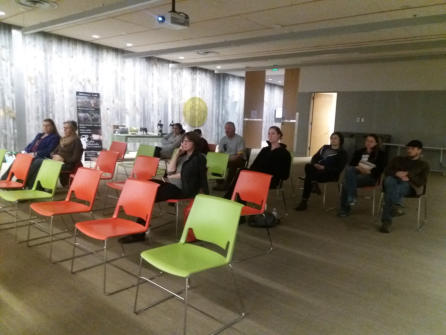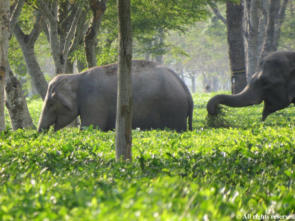Few
days
ago
in
The
Billings
Public
Library,
Lisa
Mills
of
the
University
of
Montana
brought
us
for
a
free
photographic
journey
to
Asian
elephant
country
to
discover
how
tea
plantations
are
working
to
create
solutions
for
the
ongoing
human/animal
conflicts.
The
Project
is
young,
only
2
years
old
but
already
very
successful.
And
have
a
wonderful
story
about
a
participant
from
the
Indian
side
who
gave
his
property
for
the
wild
life.
The
government
of
India
remained
indifferent
to
his
deed.
But
one
day
this
place
will
become
a
national
park
and his grandchildren will be proud of him.
- What the impact of tea on elephants?
Lisa
Mills:
There
are
several
things:
loss
of
habitat,
human-elephant
conflict,
poisoning,
ditch
hazards
and
obstacles
to
movement,
electrocution.
For
example
electric
fencing,
if
not
installed
properly
for
safety,
can
be
especially
dangerous
as
an
electrocution
hazard
for
elephants.
The
electric
traps
can
make
elephants
very
upset
and
they
can
react.
Attack
human
or
their property.
-
How you can describe your mission?
Lisa
Mills:
We
try
to
help
people
and
elephants
to
establish
relationships
in
which
both
parties
are
in
safety.
We
have
the
team
we
put
together.
if
some
of
the
owner
of
tea
plantation
wants
to
be
elephant
friendly
we
go
to
them,
we
tell
them
about
the
standards
that
we
develop
to
remove
some
things
like
electrocution
or
potential
for
poisoning.
They
have
to
change
these.
They
have
to
have
habit
how
available
elephants
move through.
- Are they pretty receptive to these ideas?
Lisa
Mills:
Yes,
because
the
getting
more
money
out
of
this.
We
give
them
dollars
extra
per
kg
of
tea
they
sell
and
it
is
very
big
deal
in
India.
Of
cause
we
control
that
they
keep
all
the
standards
about
elephant
safety.
And
then
we
make
everything
in
way
that
tea
money
goes
to
community
in
the
area
around
elephant
friendly
plantation
to
help
people
who
suffered
from
human-elephant
conflicts.
We
help
restore
the
destroyed
houses
with
this
money.
And
also,
if
a
man
in
the
family
died
during
a
clash
with
an
elephant,
then
we
financially
support
his
wife
and
children.
For
information
on
how
to
become
a
Certified
Elephant
Friendly
Tea
plantation or source certified tea contact:
lisa.mills@umontana.edu
Also must visit
https://elephantfriendlytea.wordpress.com
Nota
Bene!
Asian
elephants
are
a
wide-ranging
species
with
an
important
ecological
role.
As
mega-herbivores,
elephants
feed
on
a
large
variety
of
plants
and
disperse
seeds
throughout
the
forest
in
their
waste,
also
known
as
dung.
Asian
elephants
are
endangered,
primarily
due
to
habitat
loss.
Despite
the
conversion
of
prime
elephant
habitat
for
human
settlements
and
agricultural
uses,
elephants
travel
along
ancient
migratory
routes.
In
Assam,
India,
this
engrained
habit
brings
elephants
in
close
contact
with
people,
especially
around
tea
plantations
and
their
surrounding
communities.
Shrinking
habitat
in
the
region
leaves
elephants
with
little
choice
for
alternative routes to avoid areas of ever-expanding human development.








Lisa Mills about Certified Elephant Friendly Tea
Elephants
Few
days
ago
in
The
Billings
Public
Library,
Lisa
Mills
of
the
University
of
Montana
brought
us
for
a
free
photographic
journey
to
Asian
elephant
country
to
discover
how
tea
plantations
are
working
to
create
solutions
for
the
ongoing
human/animal
conflicts.
The
Project
is
young,
only
2
years
old
but
already
very
successful.
And
have
a
wonderful
story
about
a
participant
from
the
Indian
side
who
gave
his
property
for
the
wild
life.
The
government
of
India
remained
indifferent
to
his
deed.
But
one
day
this
place
will
become
a
national park and his grandchildren will be proud of him.
- What the impact of tea on elephants?
Lisa
Mills:
There
are
several
things:
loss
of
habitat,
human-
elephant
conflict,
poisoning,
ditch
hazards
and
obstacles
to
movement,
electrocution.
For
example
electric
fencing,
if
not
installed
properly
for
safety,
can
be
especially
dangerous
as
an
electrocution
hazard
for
elephants.
The
electric
traps
can
make
elephants
very
upset
and
they
can
react.
Attack
human
or
their
property.
-
How you can describe your mission?
Lisa
Mills:
We
try
to
help
people
and
elephants
to
establish
relationships
in
which
both
parties
are
in
safety.
We
have
the
team
we
put
together.
if
some
of
the
owner
of
tea
plantation
wants
to
be
elephant
friendly
we
go
to
them,
we
tell
them
about
the
standards
that
we
develop
to
remove
some
things
like
electrocution
or
potential
for
poisoning.
They
have
to
change
these.
They
have
to
have habit how available elephants move through.
- Are they pretty receptive to these ideas?
Lisa
Mills:
Yes,
because
the
getting
more
money
out
of
this.
We
give
them
dollars
extra
per
kg
of
tea
they
sell
and
it
is
very
big
deal
in
India.
Of
cause
we
control
that
they
keep
all
the
standards
about
elephant
safety.
And
then
we
make
everything
in
way
that
tea
money
goes
to
community
in
the
area
around
elephant
friendly
plantation
to
help
people
who
suffered
from
human-elephant
conflicts.
We
help
restore
the
destroyed
houses
with
this
money.
And
also,
if
a
man
in
the
family
died
during
a
clash
with
an
elephant,
then
we
financially
support
his
wife
and
children.
For
information
on
how
to
become
a
Certified
Elephant
Friendly
Tea
plantation
or
source
certified
tea
contact:
lisa.mills@umontana.edu
Also must visit
https://elephantfriendlytea.wordpress.com
Nota
Bene!
Asian
elephants
are
a
wide-ranging
species
with
an
important
ecological
role.
As
mega-herbivores,
elephants
feed
on
a
large
variety
of
plants
and
disperse
seeds
throughout
the
forest
in
their
waste,
also
known
as
dung.
Asian
elephants
are
endangered,
primarily
due
to
habitat
loss.
Despite
the
conversion
of
prime
elephant
habitat
for
human
settlements
and
agricultural
uses,
elephants
travel
along
ancient
migratory
routes.
In
Assam,
India,
this
engrained
habit
brings
elephants
in
close
contact
with
people,
especially
around
tea
plantations
and
their
surrounding
communities.
Shrinking
habitat
in
the
region
leaves
elephants
with
little
choice
for
alternative
routes
to
avoid
areas
of
ever-expanding
human development.


Elephants






Lisa Mills about Certified
Elephant Friendly Tea































